Will My Baby Get Enough Nutrition with Baby-Led Weaning? With Kinzie Matzeller, MS, RDN, CLC
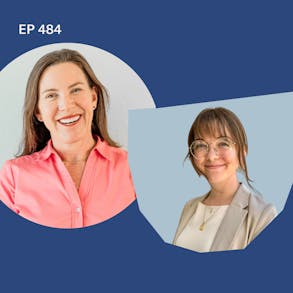
LISTEN TO THIS EPISODE
Episode Description
Can your baby eat enough to meet their nutrition needs if you skip spoon-feeding? Researcher Kinzie Matzeller discusses her recent research about baby-led weaning and whether or not it actually works.
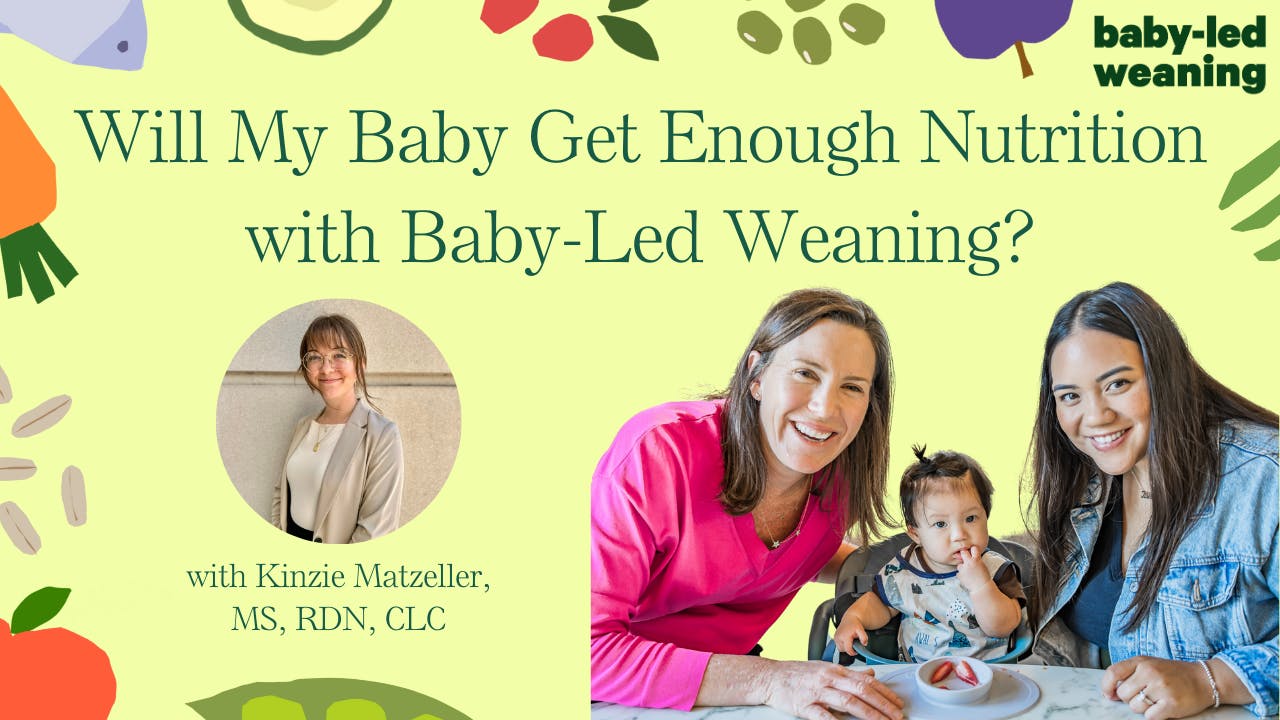
About the Guest
- Kinzie Matzeller is a dietitian and PhD student working in infant feeding
- She recently published a review article about baby-led weaning in the journal Nutrients
Links from this Episode
- Matzeller, Kinzie L et al. “Current Evidence on Nutrient Intakes and Infant Growth: A Narrative Review of Baby-Led Weaning vs. Conventional Weaning.” Nutrients vol. 16,17 2828. 23 Aug. 2024, doi:10.3390/nu16172828
- Baby-Led Weaning with Katie Ferraro program with the 100 First Foods™ Daily Meal Plan, join here: https://babyledweaning.co/program
- Baby-Led Weaning for Beginners free online workshop with 100 First Foods™ list to all attendees, register here: https://babyledweaning.co/baby-led-weaning-for-beginners
Other Episodes Related to this Topic

Latest Episodes
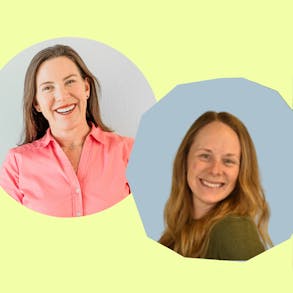
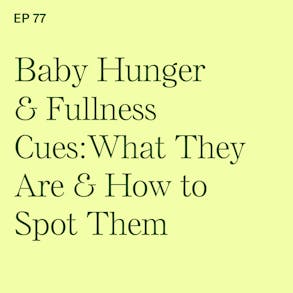
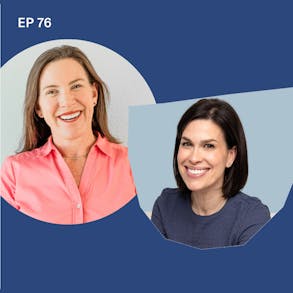
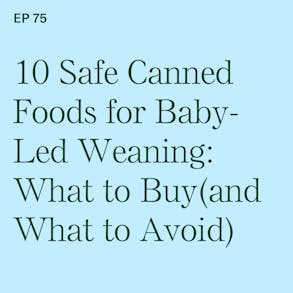
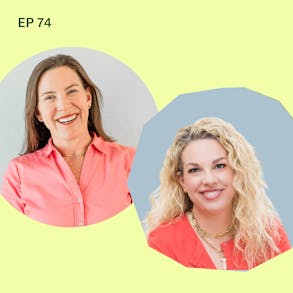
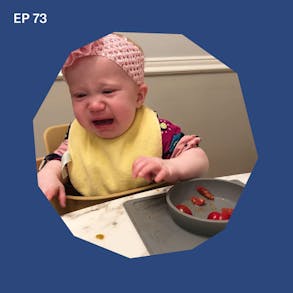
Katie Ferraro (0s):
If you're new to this whole world of Baby-Led Weaning, and starting solid foods, you might still be on the fence as to whether this approach is going to work for you. And if that's the case, I want to send you my free feeding guide called Will Baby-Led Weaning Work for My Baby. This is a guide that contains a decision train map that you can work your way through to determine if this is the right approach for you guys. And then when it's time to start, grab your copy of Will Baby-Led Weaning Work for My Baby on my website, head babyledweaning.co/resources. Okay. Parenting is hard for sure, but this is easy. Listening to Stroller Coaster. Stroller Coaster is a podcast hosted by Lynn Smith. She's a mom and former news anchor for NBC and the show's Co-hosted by an improv comedian Stroller Coaster is a place to be entertained to laugh over crazy parenting moments.
Katie Ferraro (49s):
And I know I for one, have definitely learned a few new things as I listen along too. Stroller Coaster is an award-winning, top ranked parenting podcast created by Munchkin, the most loved baby lifestyle brand in the world. And the show covers topics that I know are also of interest to you, like how to stay connected to your kids once they're in daycare, in school, or what your child is trying to communicate to you when they're crying, and how to hold onto your patients as a parent. You can follow Stroller Coaster on Apple Podcasts, Spotify, or wherever you get your podcasts. Go give them a listen for a great time. I, for one, know I've really been enjoying the show and I always need something new to listen to.
Katie Ferraro (1m 30s):
Check out Stroller Coaster. I think you'll enjoy it as well.
Kinzie Matzeller (1m 35s):
I do think that it's important for iron and zinc to be in kind of the forefront of parents' minds when they're feeding their babies in complimentary feeding. But there are foods that have them naturally occurring. It's found in meat, it's found in poultry, it's found in beans and legumes.
Katie Ferraro (1m 48s):
Hey there, I'm Katie Ferraro, registered dietitian, college nutrition professor and mom of seven specializing in baby-led weaning here on the Baby-Led Weaning with Katie Ferraro Podcast. I help you strip out all of the noise and nonsense about feeding, giving you the confidence and knowledge you need to give your baby a safe start to solid foods using baby-led weaning. Okay, one of my biggest pet peeves in the scientific community is if you're researching a topic that's new to you, you're maybe trying to review the research, the publications or the literature that exists. And instead of getting concrete black and white, yes no answers, you see researchers who say, you know, X, Y, or Z, but more research on this topic is needed.
Katie Ferraro (2m 34s):
And I'll save you the heartache because I've probably done the most comprehensive literature review one can in the field of baby-led weaning. And pretty much every article includes, well baby-led weaning appears to be safe and doesn't lead to growth faltering or nutrient gaps or higher risks of choking than spoonfeeding. But more research is needed. Well, today I have an actual baby-led weaning, a researcher here to pick the brain of. Her name is Kinzie Matzeller and Kinzie is a registered dietitian. She's a senior clinical research coordinator at the University of Colorado's, Ann Schutz medical campus where she's also working on her PhD. So Kinzie works with researchers who are doing work and research in the world. The space of infant feeding and Kinzie was the lead author on a recent review paper that was published in the Journal Nutrients.
Katie Ferraro (3m 21s):
This is kind of all over my feeds and my Google alerts for a while and the papers in nutrients. It's called Current Evidence in Nutrient Intakes and Infant Growth, A Narrative Review of Baby-Led Weaning versus Conventional Weaning. So today Kinsey's here to talk about the research that she reviewed and she will synthesize it as it were for us since I'm pretty sure you are not interested in reading the 19 primary source documents that she covered for her publication. So Kinsey's going to just give us an overview and update on the current state of research as it exists in the field of baby-led weaning. And I know personally and professionally, I'm very interested in hearing from the new generation of nutrition researchers.
Katie Ferraro (4m 2s):
I really enjoyed this conversation with Kinsey. I think it is important that dietitians be more involved in advancing the field of baby-led weaning. And in this interview we kind of brainstorm like, you know, what's it going to take from a research standpoint to continue to move baby-led weaning away from, you know, it's kind of like judgy Facebook group origins. Okay. And I'd like to quote the American Academy of Pediatrics Nutrition Committee physician who has actually described baby-led weaning as a quote, social media driven invention. Okay, excuse me. Every day of the United States, 10,000 babies turn six months of age and the majority of their parents are confused about the most effective and safest way to start Solid Foods.
Katie Ferraro (4m 42s):
And I would argue that the vast majority of those parents is they're interested in raising a child who has a foundational love of food and they would prefer not to stress about picky eating or food allergies, force feeding a baby by spoon or short order cooking for different kids or having to buy highly processed, liquified baby foods for their baby to suck out of from an opaque plastic package. So I applaud the research that Kinzie and her colleagues are doing. And with no further ado, I want to bring Kinzie on to talk about her latest paper and to address the concerns that you might have about whether or not your baby is going to get enough nutrition with the baby-led weaning approach.
Kinzie Matzeller (5m 23s):
Hi, I am happy to be here today.
Katie Ferraro (5m 25s):
I am so excited about a registered dietitian working on her PhD, who I'm hoping you're going to dedicate your life's work to studying baby-led weaning. That might be a little presumptuous, but I told the audience a bit about your paper and your publication and your work in the intro. But just tell us how did you get interested in Baby-Led Weaning? 'cause that's something, to be honest, you mentioned you have a dog, no kids, and if you came out of traditional dietetics education, not a lot of practitioners even know what Baby-Led Weaning is. So how'd you find out about it and why'd you decide to study it?
Kinzie Matzeller (5m 51s):
My background is mostly in research as a dietitian. I went straight outta my internship, started working in infant nutrition research, specifically in complementary feeding. So I've been doing the trial that I've been working on for the last three years and kind of coming out of Covid and we came into this new sort of space of people wanting to feed their babies different foods. Wait,
Katie Ferraro (6m 11s):
Sorry, you mean real food?
Kinzie Matzeller (6m 13s):
Yes. How novel. I know. Crazy concepts, right? And so as we started recruiting and kind of progressing through the study, we were finding more and more people were asking if they could follow Baby-Led Weaning and still be in the study. And so before that I hadn't really heard of it. I only really knew like we were talking about pureed foods that they kind of tell you in a one-off when you're learning about infant nutrition. And so I started doing my own research into it to also make sure that I was giving the best recommendations I could to these families that were interested in it.
Katie Ferraro (6m 47s):
And then how does it work? Do your bosses tell you like, Hey, you need to research this, or do you go to your bosses and you're like, Hey, there's a little bit of a gap in the literature about this topic. Can I do my paper on this?
Kinzie Matzeller (6m 58s):
Yeah. So a lot of it, I am really fortunate in my program and in my relationship with my mentor that I get to contribute a lot of ideas. And so I approached her and I was like, hey, this is something that we're finding in a lot of our families. This is also something that when I was looking into it, there's just not a lot of research out there. So what can we do to that would benefit us and also benefit our families and babies moving forward?
Katie Ferraro (7m 20s):
Alright, so in the outset of your paper, you mentioned that despite lots of recommendations about what foods to offer infants for complimentary feeding, there is minimal research supporting how or what's the best way to offer these foods. And I agree like that's really confusing to parents if they're trying to decide, huh, am I gonna do baby-led weaning or conventional adult-led spoonfeeding. So I'm curious to know how did you arrive at and pick the 19 studies that were reviewed in your publication? Yeah,
Kinzie Matzeller (7m 46s):
So we started out by searching PubMed and based to pretty large databases of research papers. And I put in a pretty broad search. I just typed in complimentary feeding, infant feeding, baby-led weaning and infant growth in the search parameters. And that returned over 300 articles, which not all of them were relevant, some of them contained parts of that and offshoots. And so I hand sorted through those 300 articles, I read through a handful of 'em about 60 to figure out which ones were within the scope of this review that I was performing. Basically looking at infant nutrition intakes and also their growth patterns associated with that, with Baby-Led Weaning in particular.
Kinzie Matzeller (8m 28s):
So after filtering through all of those and sorting out the duplicates and all of that, we arrived with the 19 studies that we included in the publication.
Katie Ferraro (8m 35s):
And so she went through these studies and you kind of picked out the parts that aligned with what your study objectives were. And you and I were talking before the interview, but I kind of love that you didn't even address choking. We have lots of other papers about choking. Not to say more research doesn't need to be done, but in your particular study, I like that you just drilled down right on the nutrition stuff. 'cause parents are like, does this work? And by work they mean will my baby be getting enough nutrition? And that's something parents worry about. Is my baby going to quote unquote get enough nutrition if I don't spoonfeed them the purees? So of the studies that you did analyze and that you included in your paper, in your review, what differences in reported absolute energy intake? So we're talking about calories here. Did you find between Baby-Led Weaning and Conventional Weaning, is there any major difference in the caloric intake if you choose one versus the other for starting solid foods?
Kinzie Matzeller (9m 21s):
Yeah, so in those 19 studies, none of them found major differences in energy intake. Absolute. So in calories per day consumed by these babies, there were no significant differences in pretty much all of them, which was really reassuring because that's studies that have been done in multiple countries across multiple cohorts, all kind of finding the same thing that energy intakes in general, you're getting about the same, whether it's from a spoon or if the baby's feeding themselves.
Katie Ferraro (9m 47s):
And can I rephrase that? Parents thinking, oh my god, my baby's gonna starve. Your baby's not gonna starve if you let them learn how to feed themselves real food.
Kinzie Matzeller (9m 54s):
Yep. Babies are great at being responsive eaters like they eat when they're hungry, they're stop when they're full. If you allow them to do that,
Katie Ferraro (9m 60s):
Yes. But when we start shoving arbitrary amounts of food down their mouth from a spoon, they immediately learn how to override those native instinct. So what about iron and zinc? Parents worry, okay, if I don't do those fortified baby foods that I see at the store on the aisles in the pouches, then I'm not gonna get any enough, enough nutrition. I'm not gonna get iron and zinc like I've got to do white rice cereal 'cause it's fortified with iron. They worry their babies will become deficient in those micronutrients. Does that bear out in the literature?
Kinzie Matzeller (10m 29s):
So iron and zinc are two of the micronutrients that were included in a lot of papers because as you were saying, they're really common nutrients that are pushed by all of the recommendations for feeding babies. The research was pretty all over the place. Some studies were finding that they had less iron and zinc. Some are finding that there wasn't really a difference between the two feeding methods. I do think that it's important for iron and zinc to be in kind of the forefront of parents' minds when they're feeding their babies in complimentary feeding. But there are foods that have them naturally occurring. It's found in meat, it's found in poultry, it's found in beans and legumes. I think a really interesting point about white rice cereal is white rice itself is not naturally high in iron. So it's fortified. And then you get into the concept of, you know, is it bioavailable?
Kinzie Matzeller (11m 12s):
How much are they act actually absorbing in this fortified cereal versus you know, from a piece of steak.
Katie Ferraro (11m 19s):
And then you have to weigh risk for arsenic toxicity from heavily reliance on rice foods, which every major health body recommends against the regular use of rice foods because of that. So it's kind of like it to me. It's like, okay, hey this is not a good option for a first food. We gotta find something else. And all those foods that you mentioned, the meat, the poultry, the legumes, those foods that are naturally that do contain iron in zinc, it is very possible for babies to safely learn how to eat those. It's just that those aren't the foods that the prepared manufactured foods, they don't make those foods because those are more expensive. So they're gonna sell you, you know, products that are bathing, just sitting in applesauce or pear puree and they're gonna call it kale. Okay? But your baby's not actually eating kale when they're sucking apple sauce out of a pouch that happens to be, you know, colored green with a tiny bit of kale.
Katie Ferraro (12m 3s):
So I know as a registered dietitian, you probably picked up on a lot of the studies that look at the micronutrient intakes of baby-led weaning versus conventional adult, adult-led spoonfeeding that the families that are educated about including iron and zinc containing foods, guess what? Shocker, they offer more iron and zinc containing foods. And I think this is a big area of opportunity, especially for registered dietitians to remember, like I don't want you to freak out about iron and zinc, but I do want it to be top of mind that you should be offering a variety of foods that contain those nutrients. 'cause when I teach you this and teach you how to do that and show you how to make it safely, you're actually gonna offer your baby those foods and then guess what? They're not gonna be deficient in those nutrients.
Katie Ferraro (12m 43s):
Right. Hey, we're gonna take a quick break, but I'll be right back. Okay, I wish this were not true, but as someone who works in front of a computer or a phone all day, I know that of the average 20,000 breaths that Americans take a day, 90% of those and 90% of our time is being spent indoors. And the indoor air that we breathe can be up to a hundred times more polluted than outdoor air according to the EPA. And indoor air pollutants can lead to respiratory symptoms like sneezing, congestion, scratchy throat, or even more serious health problems like lung and heart disease. So what can we do about it?
Katie Ferraro (13m 23s):
Well, air doctor has thought a lot about this and they've put their technology to work for you. The air doctor is an air purifier that filters out 99.99% of dangerous contaminants so that your lungs don't have to. So this includes allergens, pollen, pet dander, which is a huge problem in my house as well as dust mites, mold spores, and even bacteria and viruses. Air doctor comes with a 30 day money backed guarantee. So if you don't love this product, you can just send it back for a refund minus shipping. If you head to air doctor pro.com and you use the promo code weaning, you can get up to $300 off air purifiers.
Katie Ferraro (14m 3s):
And this is exclusive to podcast listeners, but you will also receive a free three year warranty on any unit, which is an additional $84 value. You can lock up this special offer by going to A-I-R-D-O-C-T-O-R-P-R-O.com. That's airdrpro.com and use the code weaning, W-E-A-N-I-N-G to get started today. Now what about parents who stress out about the not getting enough from a growth standpoint? Like oh my gosh, my baby's gonna fall off the growth chart, or I have a small baby or you know, my doctor told me I should start solid foods early for some catchup weight.
Katie Ferraro (14m 45s):
We do a lot of education here with other experts in growth and development about, you know, off telling your parent to start solid foods early so that they can catch up with their weight. That's impossible because your baby doesn't even know how to eat solid foods yet. So I guess I wanna steer away from the parents that might have babies that have, you know, growth faltering or they have some medical fragility. Let's just talk about typically developing babies who are six months of age, they've got those other signs of readiness to eat. In the studies that you reviewed for your article, how did Baby-Led Weaning versus Conventional Weaning pan out as far as growth faltering goes? And maybe explain what growth faltering is and what some other people call it
Kinzie Matzeller (15m 21s):
For growth faltering in this age group we're really looking at how they're trending on their growth charts. So when you go into the pediatrician, they're getting your measurements, the weight, the length, the head circumference and we're plotting them and we wanna see how that trends over time. So growth faltering means that your weight or your weight for length kind of starts to plateau so you're not following those curves that we're kind of expecting babies to follow. So in terms of the baby-led weaning literature that I reviewed for this paper, the growth data was even more limited than the overall already limited scope of the literature in this field. There were no differences with growth faltering in any of the groups between in these studies. So they were finding that there was no higher rate of growth faltering associated with Baby-Led Weaning compared to Conventional Weaning.
Kinzie Matzeller (16m 6s):
And I will say that almost all of the studies found pretty low rates of growth faltering in general because in this kind of scope of infant feeding practices, a lot of the focus is now kind of shifting over towards this risk for overweight and obesity more so than growth faltering. Now that we have a few more recommendations, I would say,
Katie Ferraro (16m 27s):
I always thought it's funny, it's like some parents will freak out, oh my gosh, my baby's not gonna get enough. So they're gonna be underweight and fall off their growth chart. And then other parents will say, well I think Baby-Led Weaning is gonna lead to overeating because how will the baby know when to stop? And it's like there's no research that points to any direction that baby-led weaning doesn't cause overweight or obesity. And baby-led weaning also doesn't quote unquote cause underweight. And of course we're not talking about causation in the studies that we're looking at, we're looking at correlation. But is it safe to say that if you go the baby-led weaning route, it doesn't appear that your baby's at any elevated risk of growth faltering? Yeah,
Kinzie Matzeller (16m 59s):
I think so. I will say that there's a caveat that I think there was maybe four or five studies that actually had growth data and a lot of it was either self-reported by parents or it was obtained from pediatrician charts and not obtained by the researchers themselves. Which is a limitation for growth data. Right,
Katie Ferraro (17m 16s):
Exactly. 'cause parents, and I love that you pointed out like we're following the data and tracking the trends on the growth curve parents and always feel, oh my gosh, my baby's not getting enough. It's like, well if that's not quote unquote being born out in the data, meaning I see your baby and they're totally tracking on their growth chart as they should be, it's sometimes these are anecdotal, you feel like your baby's not getting enough. But we need the research to show, listen, your baby needs lots of time to learn how to eat and they're not gonna be at risk for falling off the growth chart if you give them that time. Plus you're of course continuing to offer breast milk or formula, which is a very important source of nutrition even as the baby starts Solid Foods. I thought it was interesting that you found, and you cited that caregivers and parents who use Baby-Led Weaning with their infants are more likely to obtain information about Solid Foods from social media and less likely to consult a healthcare provider for the information.
Katie Ferraro (18m 1s):
So personally, as a healthcare provider working in the social media landscape, I'm curious to hear what you think another registered dietitian like, what do you think that that says about the need to educate other healthcare providers about this evidence-based approach to starting solid foods so that new moms don't feel like, oh my gosh the only place I can go to learn about starting solid foods is from TikTok?
Kinzie Matzeller (18m 20s):
Yeah, I also thought that was interesting, especially 'cause it was in a couple different studies so it wasn't just like an isolated incident in one cohort. I do think it's important to mention that they said social media, but it didn't specify whether that was have read like a registered dietitian on social media if it was a healthcare provider, if it was just, you know, a mommy group that they joined on Facebook. So there isn't a way to differentiate what the source of information was on social media.
Katie Ferraro (18m 46s):
If I may Kinzie, most of the people talking about baby-led weaning on social media have absolutely no idea what they're saying for sure. And are certainly not qualified to be giving you information about starting solid foods. So I definitely, definitely applaud pediatricians in the work that they do. But you and I both know that doctors in this country, you know more than 90% of them have never had a dedicated nutrition class. So like we have got to get the physicians on board to understand how this works and how to do it safely. And also you don't have to be an expert in it, but you do need to know where to refer. And so having other credentialed feeding experts like yourself and myself in this space, you gotta meet the parents where they're at and they're on social media. I get it about going there, but it is scary to hear like, you know, you put it in your paper that like these people are going to social media to learn about it not necessarily to their doctor.
Kinzie Matzeller (19m 29s):
Right? And I think that that's something that providers just need to be aware of as they're like getting, you know, babies who are coming in around four or five, six months and they're getting ready to start solids. I think that they need to be ready to share evidence-based research and information to try and prevent some of this spread of misinformation that they might be getting from these other sources.
Katie Ferraro (19m 49s):
And I can tell you that I've been working exclusively in teaching Baby-Led Weaning for eight years and the tide has definitely started to turn. The pediatricians are coming to me and saying, all right Katie, I have heard enough parents ask me about Baby-Led Weaning, what's the deal? Where's the research? Show me how to do it. Because they have been coming off of social media and again the pandemic did a lot for elevating, you know, what people learn on social media. But finally we do see a lot of the credential people coming and saying, you know, I want to learn about this from you who's an expert in this space because so many parents are coming me to me with really random stuff that they're seeing on social media from people who aren't experts in this space. And I personally am happy to see, and we know anecdotally the pediatricians, once they do this with their own baby, they're like, oh my gosh, this makes so much more sense.
Katie Ferraro (20m 31s):
And pediatricians and family practitioners who were suspect of the baby-led approach when they actually do it and see it in practice, they're like, oh my gosh, this is such a more natural way to start Solid Foods than force feeding a baby by spoon Kinzie. What were some of the limitations of the existing research studies about Baby-Led Weaning that you found? Like there's no such thing as a perfect study, but you mentioned like there's self-report or you know, parents will say their baby's choking when you, and I know they're actually probably just gagging. Like where, what were some of those other limitations that you found as you were reviewing the existing literature?
Kinzie Matzeller (21m 0s):
There's a lot of limitations in the current research. The biggest one is that there just isn't a whole lot of it. And even more specifically, there's a lack of randomized controlled trials looking at Baby-Led Weaning in a more open parent-led sort of way. So what I mean when I say that is there's one cohort that comes outta New Zealand that followed a modified Baby-Led Weaning approach and it was more focused on nutrition education and that portion of it more than the baby-led meaning aspect. So I don't, it was included in my paper, I don't necessarily include it in this sort of space that I'm talking about right now. So because there's not a lot of randomized controlled trials, a lot of the research is observational, meaning that they're getting this data as a secondary analysis from other studies that they're doing.
Kinzie Matzeller (21m 46s):
And so that means that they're not randomized into a baby letter control group, which can then lead to some differences in demographics, in mode of feeding, in gender. So I think the lack of research is one of the biggest limitations and I discussed that in the paper. Another one is how their intake was recorded. So they all used some sort of dietary recall, however they didn't quantify breast milk intake. So in order to do that, when you're thinking about how do you measure how much a baby is getting at the breast, you have to weigh them before and after feeding, which is a lot, it's a lot to ask parents to do, but that is the only way to actually measure breast milk. And so a lot of these studies are finding higher rates of breastfeeding in baby-led weaned cohorts.
Kinzie Matzeller (22m 32s):
So it's possible that these estimations of breast milk intake are also off and that could be leading to not seeing differences or seeing some of these other differences in their nutrient intake. So being able to do studies that have like measured breast milk intake in addition to their formula in Solid Foods I think is one of the other limitations in the research. And then the last one we already kind of touched on is the growth data, the fact that there's not a lot of it and also that it was self-reported, it was obtained from chart reviews and not all of it was obtained from research measured anthropometric.
Katie Ferraro (23m 8s):
What about the length of the studies? You said that one of the limitations, was there a lot of short-term studies? Like what would you like to see more of? I mean obviously follow them out for their whole life and be like, oh my gosh, that adulthood the Baby-Led Weaning babies love food and the spoonfed babies hate it. I mean that's not, that's a gross generalization and really oversimplifying it. But like what's a good length of time for a study?
Kinzie Matzeller (23m 28s):
I think at least to make long-term generalizations about how these babies are growing and they're eating and feeding behaviors long term, you have to follow them for at least 3, 4, 5 years up until school age because that's when they're actually starting to establish these eating habits. They've kind of their past infancy, their past toddlerhood, they're getting into early childhood and those are the timeframes that we really wanna see if growth differences specifically are persisting.
Katie Ferraro (23m 53s):
Hey, we're gonna take a quick break but I'll be right back. As a new parent, are you surprised by how quickly the pictures of your child have come to dominate the photo space on your phone? And While you certainly want to share them with certain members of your inner circle. Keeping your kids' photos private is also important. So that's where the Family album app comes in. This free app was created to give parents a secure and easy way to share photos and videos with loved ones. The Family Album app creates an instantaneous digital time capsule of your family's journey where all of the memories are chronologically organized and the app automatically sorts photos and videos by month and year while displaying each child's age, which makes its so easy to see your child's growth over time in this digital age your child's privacy is gold and the family album app is Fort Knox.
Katie Ferraro (24m 49s):
It's an exclusive space accessible only to those you invite. So there's no unwanted eyes, just a secure personal haven for your family's memories. If you are looking to level up your photo sharing and organization game with a secure one stop easy to use photo organization app, head over to the app store, search family album, that's one word, family album and download the family album app for free and start creating a legacy of love one photo at a time. Kenzie, I have an idea like you know the Framingham heart study where they study them forever like you are I don know how old you are, but I'm guessing that you're significantly younger than me.
Katie Ferraro (25m 33s):
You should start the equivalent of the Framingham heart study, but for Baby-Led Weaning babies and then you follow them out through the course of their life that kind of also goes along the trajectory of your own research career. And at like every touch point we like check back in about, you know, 'cause obviously your first bites are so important in the way you're introduced to food is so important. And you're right, a lot of these studies drop off like by the time they're two or three and you know how much you know eating habits change and then how many different outside factors start affecting your foods. But if you've never been exposed to these foods as a baby, there's really not a good opportunity for you to kind of try to achieve that flavor window again. So I think you should study them for the entirety of their life, starting with whatever babies you're studying right now. Just a suggestion.
Katie Ferraro (26m 14s):
Yeah,
Kinzie Matzeller (26m 14s):
Wouldn't that be a dream?
Katie Ferraro (26m 15s):
Okay, I have another dream scenario. Okay. 'cause in your conclusions you point out the literature is generally in agreement that baby-led weaning and Conventional Weaning provides similar energy and that a baby-led weaning approach may have potential benefits for long-term outcomes but without conclusive evidence regarding macronutrient and micronutrient intakes and growth outcomes, the ability to comprehensively recommend baby-led weaning as a complimentary feeding approach. It's quote unquote limited at this time. So I wanna ask you two final questions related to this. If money and reality were no factors, tell me what the ideal study is that you would design to find out definitively if baby-led weaning quote unquote works as a complimentary feeding method. So I want you to answer that part first.
Katie Ferraro (26m 56s):
Money and time and reality are no factors. What's your perfect study? But then also because money and logistics are factors in the research world, like what specific types of studies that could actually be done would you like to see to shed more light on the effectiveness of Baby-Led Weaning as a complimentary feeding method. So like the perfect case scenario and then the real life scenario.
Kinzie Matzeller (27m 15s):
I love this question because as I've kind of branched into this research field, it's something I've thought about a lot. So the dream scenario, it would need to be a large scale trial. You'd wanna do a power calculation to basically figure out how many participants you need to see the differences or not see differences that you're expecting. So you'd want at least 70 to a hundred participants per group and that would be like per study site. So if you wanted to do this in multiple areas in the US because obviously the US is bigger than a lot of these other countries that have done this, you'd probably want at least three sites. So that would be a total of about 300 participants per group spread out across the us. Then you would randomize them using block randomization.
Kinzie Matzeller (27m 58s):
So when you enroll an infant you would wanna randomize them based on motive feeding. So if they're getting breast milk or formula or both. And I think it's important to include formula because it's not going anywhere in the US There's a huge chunk of babies that receive formula in some way, shape or form. And although breastfeeding is the gold standard, they, you can't just ignore these formula fed babies either. So I would ideally recruit all sorts of babies from all walks of life, enrolling them at five, four to five months before they really have a chance to start Solid Foods. And then they would be randomized and then they would receive nutrition education, we would follow them monthly so that we can see some of these smaller changes.
Kinzie Matzeller (28m 38s):
We can watch their dietary patterns on a closer basis rather than just doing a visit in the me the beginning and a visit at the end. And then after they've done their, you know, five to 12 months of age monthly study visits, I would love to follow them like we were just saying, as long as possible. Bare minimum would be school age. I think it would be great if you could follow them into adulthood and in this dream scenario where we have unlimited funding that would be possible. And then also being able to assess dietary intake, growth outcomes, cognitive outcomes, things like that.
Katie Ferraro (29m 12s):
Okay. I, my only suggestion to improve your study design, which I love by the way, is I would follow them weekly after they start Solid Foods because even monthly so much changes from six to seven months when you start Solid Foods and from seven to eight months. But if they're not getting exposure to a variety of foods and flavors and tastes and textures, nothing changes and that's when they start to fall behind. So like really close observation 'cause it's like it's fascinating what changes week over week, even in the first few weeks of Baby-Led Weaning
Kinzie Matzeller (29m 39s):
For sure.
Katie Ferraro (29m 39s):
All right, tell me the real life scenario though.
Kinzie Matzeller (29m 41s):
Yeah, I, as I was saying, I've been doing a research study that looks at complimentary feeding. And so I think that we could do that dream scenario in a smaller scale. So that would be monthly visits from five to 12 months. You could still randomize based on those factors that we talked about before into two groups, conventional versus baby-led. And then following their growth, having them do weighed diet recalls including test weighing of breast milk intake for breastfed babies and then probably following them for at least two years post-study completion. That is something that's feasible, especially if you get the right funding sources. And that would give us a randomized control trial looking at baby-led meaning in this cohort.
Kinzie Matzeller (30m 25s):
And I think that that is a feasible option.
Katie Ferraro (30m 27s):
I think it's very feasible. I think it's ridiculous that we couldn't get a study together with 300 babies. I think you should come to California, go to the PHFE wic, the largest WIC association in California, really forward thinking and proposes to them because half of all babies in this country are on the WIC program. There's already the built-in infrastructure for providing nutrition education. There's already monthly checks which are of course checks, meaning check-ins tied to the benefit that they're receiving. And we know that parents, whether or not they're in wic, yes or no, they're interested in this approach and everybody wants their babies to essentially learn how to eat real food. So we, we need to be studying it. 'cause as we were talking earlier, it's like the undoing of all the quote unquote education we've had from the package and process commercial food companies that tell us how to feed our babies.
Katie Ferraro (31m 11s):
Like we need trained professionals telling us how to feed our babies and more people like you working in this research world. So I don't know what I can do to help you make all of these studies a reality, but I think your paper really shed light on the fact that you, you see papers that are like, oh more research is needed and it's such a cop out. Like there really is more research needed and this, this is so important. And by the way, this is nothing new. Like my own mom is a dietitian and she thinks it's so asinine that I have an entire career teaching parents how to feed babies. She's like, I had six kids, they just eat the same food that you eat. And I was like, mom, it's not like that parents have so much anxiety over this. And she's like, so we need research to show parents that babies can eat real food. I'm like, yes. Like it's not out there.
Katie Ferraro (31m 52s):
You gotta do it. This is a lot of pressure on you. I'm sorry but
Kinzie Matzeller (31m 55s):
Yeah, we
Katie Ferraro (31m 56s):
Need more of your research kids.
Kinzie Matzeller (31m 58s):
Yeah, well we have a manuscript that should be coming out soon looking at baby-led weaning, keep
Katie Ferraro (32m 2s):
'em coming because a lot of the good stuff, even a lot of stuff that you, it, it's getting old now and again, the way a baby learns how to eat food, it's not irrelevant 'cause they did those studies in 2012 and 2013, but I'm presenting at places where they won't even let me use citations if they're longer older than 10 years old. And we're coming up on that for some of the baby Led Weaning research. So like, I mean this is job security for you girl. Like there's a lot of research to be done, but I really would encourage you to work with WIC if you can because they are a built in cohort for this and half of all babies born in this country are already there. Like we need these big large scale studies. We can't just have 16 parents. And again, I mean I'm on social media with half a million parents who are interested in Baby-Led Weaning. Like don't tell me we can't get 300 parents.
Katie Ferraro (32m 42s):
I know there's some selection bias there, but I'm just saying like, this is what I talk to every researcher about is like there's a lot of parents out there that wanna be part of these studies, but it's like, I know it's on you guys to find the money and get them actually funded. So thank you for the work that you're doing in this space of Baby-Led Weaning and I really hope to see lots more articles coming out as you, you know, ramp up your career in nutrition education and I'm just really excited to meet a young energetic researcher who's like taking this on.
Kinzie Matzeller (33m 6s):
Yeah, for sure. I, I am excited for kind of the next steps in getting more research on this out there for parents. So. Well
Katie Ferraro (33m 13s):
Thank you Kinzie. I really appreciate your time and your expertise and I look forward to seeing what you're working on in the future.
Kinzie Matzeller (33m 18s):
Yeah, thank you for inviting me.
Katie Ferraro (33m 21s):
Well, I hope you guys enjoyed that interview with Kinsey. She's working on her PhD. She just published an article in the Journal Nutrients All About the review articles kind of synthesizing the data about baby-led weaning. So I'll link to the publication in the show notes for this episode and that'll be online at blwpodcast.com/485. A special thank you to our partners at AirWave Media. If you guys like podcasts that feature food and science and using your brain, check out some of the podcasts from AirWave. We're online at blwpodcast.com. Thanks so much for listening and I'll see you next time.

The Program Baby-Led Weaning with Katie Ferraro
A step-by-step digital program for starting solid foods safely and navigating the original 100 FIRST FOODS™ meal plan with baby-led weaning.
 EXPERT-LED, PROVEN APPROACH TO EATING REAL FOOD
EXPERT-LED, PROVEN APPROACH TO EATING REAL FOOD CONCISE VIDEO TRAININGS TO MASTER BABY-LED WEANING
CONCISE VIDEO TRAININGS TO MASTER BABY-LED WEANING 100 FIRST FOODS DAILY MEAL PLAN WITH FOOD PREP VIDEOS
100 FIRST FOODS DAILY MEAL PLAN WITH FOOD PREP VIDEOS
Baby-Led Weaning for Beginners Free Workshop
Is your baby ready to start solid foods, but you’re not sure where to start? Get ready to give your baby a solid foundation to a lifetime of loving real food…even if you’re feeling overwhelmed or confused about this next stage of infant feeding.
Get baby-led weaning recipes and tips delivered to your email inbox.

